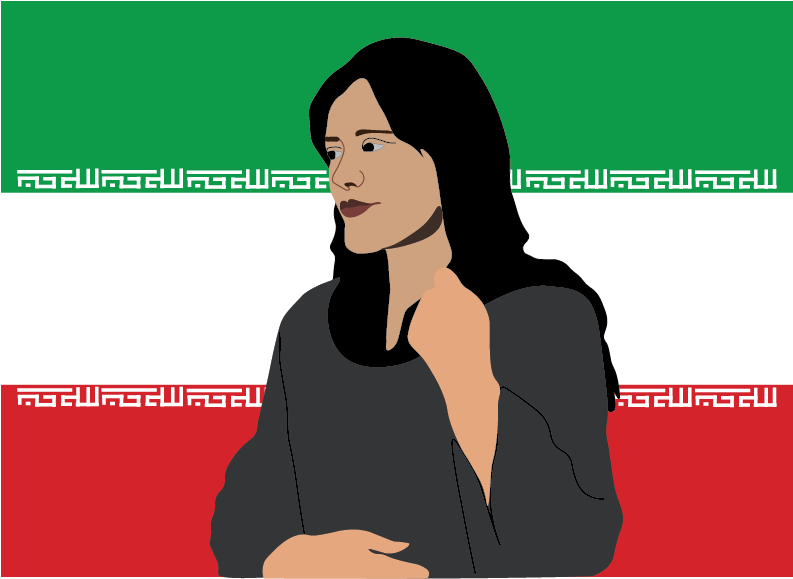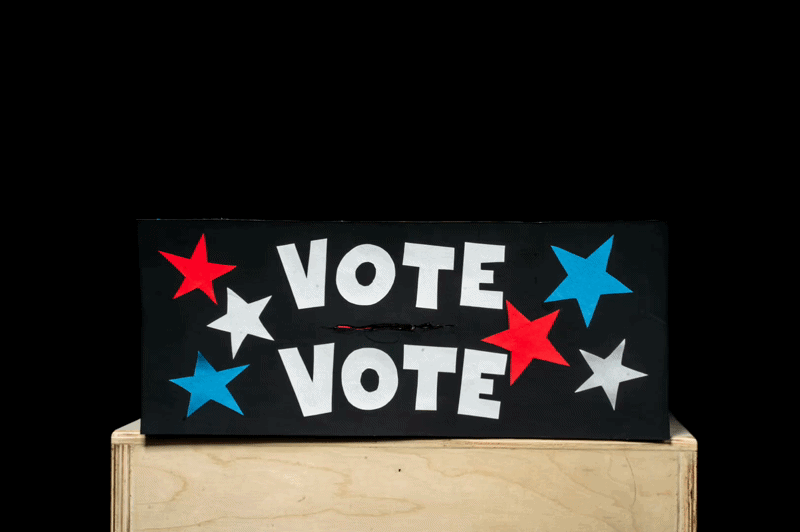Iranian 22-year-old Mahsa Amini was arrested by the Iranian morality police on Sept. 23, claiming that she was wearing her hijab improperly.
Morality police were “formally set up … and they (women) were often harassed and attacked for not correctly wearing the hijab,” according to NPR. Three days later, Amini died under police custody.
Amini’s death initiated several women-led protests against morality police brutality in cities throughout Iran.
”It’s devastating and paralyzing,” Art History and Design Assistant Professor Parisa Ghaderi said. “I spend most of my days just … just looking at all these horrible, violent videos that coming out of Iran. It’s just there’s so much violence on the streets, and it’s just the emotional burden that it has on all the Iranian community here who still have close ties to Iran.”
Before the Islamic Revolution of 1979, many women fought alongside the men: hijabs were not forced and women were allowed to wear what they wanted. However, shortly after the revolution, all women were required to wear hijabs.
Women began protesting in the 1980s, but their voices were quickly oppressed by men in power as they began getting arrested and killed.
Iran-born and raised chemistry graduate student Samin Aayanifard was also arrested by morality police for “improperly” wearing their hijab.
In front of a subway station filled with morality police, Aayanifard was en route to see their friend.
A female morality police officer stopped Aayanifard and asked to show their ID to her and then continue on with their day. However, after showing the morality police their ID, Aayanifard was ordered to sit in a van to be taken to the police station.
When the morality policewoman saw Aayanifard cry, she told them that she’s seen enough women cry in front of her, to stop crying and that it’ll be O.K.
“I was remind[ed] all the bad things that people might do for being in this place, for taken to the police station, and I was insisting that I didn’t do anything bad,” Aayanifard said.
Aayanifard was then forced by the morality police to call their dad to explain how they committed a “bad” act.
At the police station, Aayanifard overheard police debating various opinions on their hijab covering: one agreed that Aayanifard didn’t wear their hijab improperly but others agreed that it would look bad on the police to let Aayanifard go without covering up.
Ultimately, Aayanifard was able to receive a lab coat from a friend and was finally allowed to leave.
”That was the only time that I was tricked, and I was forced to the van,” Aayanifard said. “But the other times, I learned that I should shout in the street and people will help me if I start shouting.”
Aayanifard and Amini’s cases aren’t rare; there are several other incidents of morality police hurting and killing women. However, the death of Amini has blown up and further tested Iran women’s tolerance of police brutality, according to Ghaderi.
Since Amini’s death, Aayanifard hasn’t been able to read or focus on their academic work. They feel as if there’s always something more they could do, whether it be posting on Twitter or reading more of the ongoing news.
”The fact that the huge price that they’re paying for this freedom and the fact that — no matter [if] I am Iranian or not — I could be those women in those settings if I was born there,” Aayanifard said. “They are fighting with their lives. … It just makes me feel like I should be paying more attention to what is more important than what benefits me the most.”
On Sept. 25, Iranian Students Association of MSU, or ISA, held a rally at The Rock with around 80 Iranian students and supporters.
“That’s the easiest thing that I can do,” Ghaderi said. “Here, as someone who’s not risking her life, and I’m not fighting in the streets. I don’t have to fight any authority. I think that’s an easy, safe task for me to just be a voice for those that are suffering and who are risking their lives.”
Support student media!
Please consider donating to The State News and help fund the future of journalism.
On top of worldwide protests on Oct. 1, locally, ISA held a protest in downtown East Lansing on Oct 2.
Held on the intersection of M.A.C. Avenue and Albert Street, many people stopped by, curious about the protest. Other onlookers raised their clenched fists and repeated with ISA as they walked by, according to Aayanifard.
Many Iranian women around the world are also ripping off their hijab and shaving or cutting their hair in protest of what Iranian men used to do to women during the revolution as a form of punishment, according to Aayanifard.
Although Ghaderi sent emails to various MSU leaders, she calls on the MSU community for emotional and social support.
”This is the right time to at least show some solidarity with people in Iran and acknowledge their pain,” Ghaderi said. “Not their pain, but also our pain as bystanders … But, I think the emotional burden and the emotional toll also is very paralyzing. I know that there are many students here that they have to attend their classes, do their research, all these being student tasks, but even for me when I teach … it’s just so much distraction, and I cannot fully function with all these things.”
Aayanifard recommends others read about islamophobia and removing compulsory hijabs and recommends that MSU should take some action to bring awareness to Iran.
“[Marginalized and underprivileged communities] shouldn’t shout so that MSU hears us,” Aayanifard said. “This feeling that they are acting the same as if nothing has happened, makes me believe that all of those workshops, compulsory courses … for us, is just telling the other universities, maybe, that we are also during that. We are trying to include people, but in reality, they’re not including us. They’re not hearing our voice, and we’re shouting.”
Discussion
Share and discuss “MSU's Iranian community channels anger into protests over morality police” on social media.







